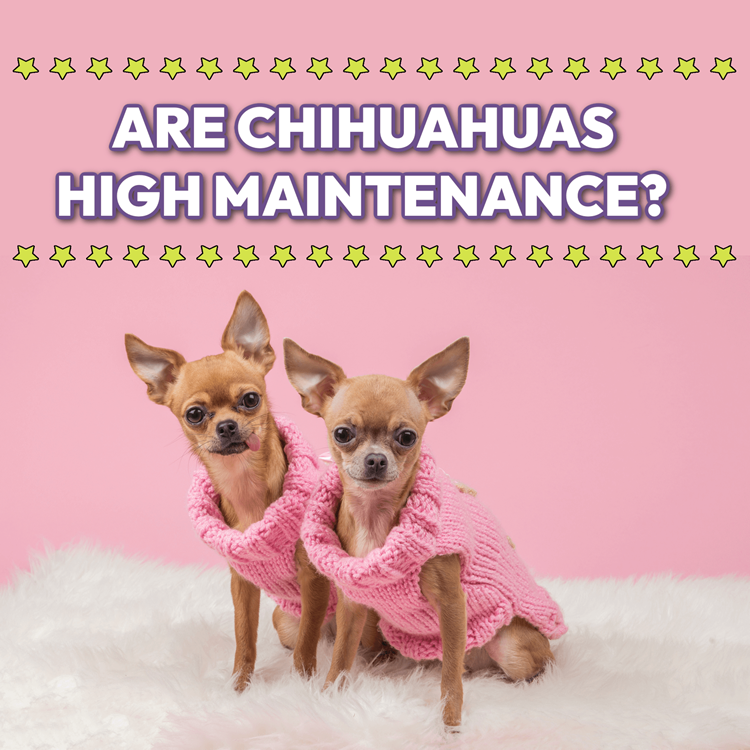
If you’re thinking about adding a Chihuahua to your family, you might be wondering whether they are high maintenance. Raising any dog requires a lot of hard work. Some breeds, though, are more demanding than others. So, are Chihuahuas high maintenance?
What Is a High-Maintenance Breed?
High-maintenance breeds are those that require more time, energy, money and effort to raise than other breeds. The American Kennel Club (AKC) currently recognizes about 200 dog breeds, whereas the International Canine Federation (FCI) recognizes nearly twice as many breeds.
Each breed is unique. Beagles, for instance, are known for their floppy ears and high energy levels. They were originally bred for hare hunting in 16th-century England, so they need more exercise than non-hunting breeds. Bulldogs, on the other hand, have short faces that predispose them to a myriad of medical conditions, such as brachycephalic airway syndrome and allergic rhinitis. Bulldogs also have lots of skin folds that must be cleaned regularly.
All breeds require some work to raise, but high-maintenance breeds come out on top. When compared to other breeds, they need more exercise, trips to the veterinarian, grooming, home adjustments, special diets and more. Unless you’re willing to meet their taxing demands, you shouldn’t get a high-maintenance breed.
Chihuahuas Are Not High Maintenance
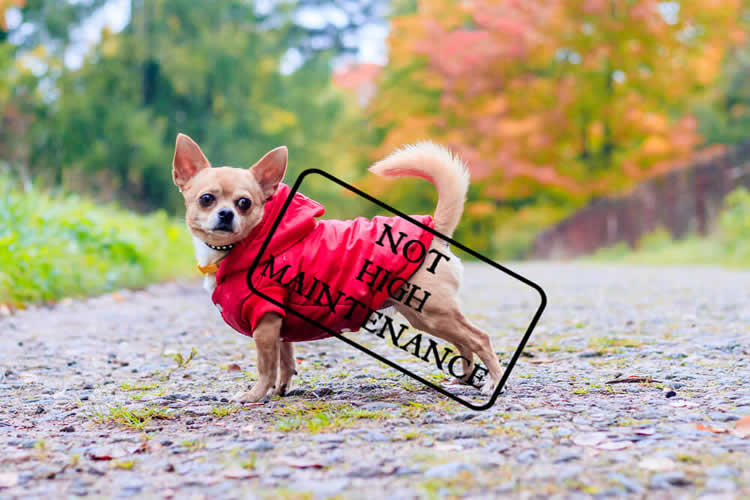
Chihuahuas aren’t high maintenance. Raising a Chihuahua is undoubtedly a lot of work, but there are plenty of other, more demanding breeds out there.
Breeds that are considered high maintenance include:
- Afghan Hound
- Akita
- Bichon Frise
- Border Collie
- Boxer
- Brussels Griffon
- Cavalier King Charles Spaniel
- Chow Chow
- Cocker Spaniel
- Dalmatian
- English Bulldog
- English Springer Spaniel
- French Bulldog
- German Shepherd
- Golden Retriever
- Great Dane
- Irish Setter
- Newfoundland
- Pomeranian
- Poodle (Standard, Miniature, and Toy)
- Saint Bernard
- Samoyed
- Shar-Pei
- Shih Tzu
- Siberian Husky
- Weimaraner
- Yorkshire Terrier
Maintenance Requirements for Chihuahuas
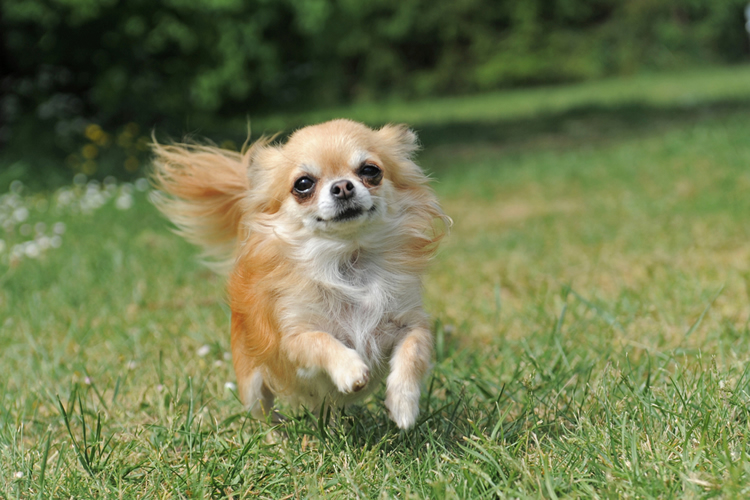
By familiarizing yourself with the breed’s maintenance requirements, you can decide whether a Chihuahua is right for you and your family. Chihuahuas aren’t high maintenance, but they do have maintenance requirements. Your Chihuahua’s health and happiness are dependent upon you meeting these requirements.
Energy: Medium Maintenance
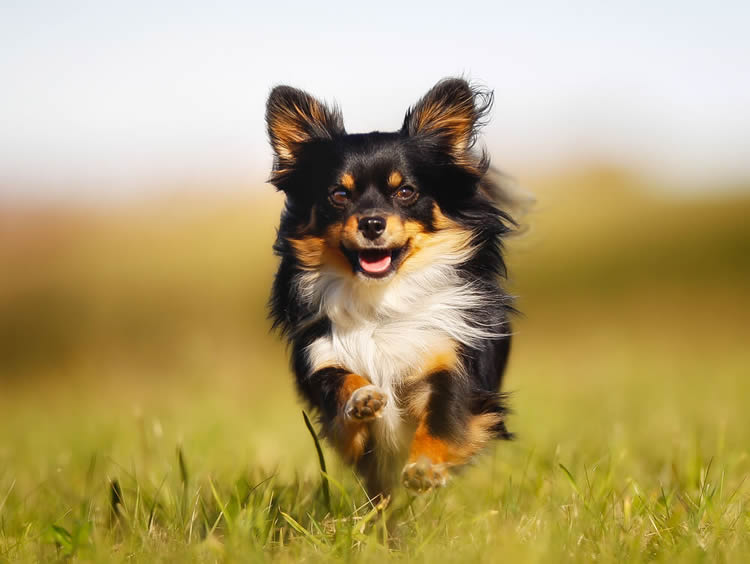
Chihuahuas have medium energy requirements. Many of them love to play fetch and tug-of-war. Other Chihuahuas will run around in circles fast — a phenomenon known as frenetic random activity periods (FRAPs) or simply the “zoomies.”
While Chihuahuas have higher energy levels than many other breeds, their exercise demands are easily met. You don’t need a large backyard. Because they are so small, Chihuahuas can run and play in small areas. You can chase your Chihuahua around in the living room, or you can take him for a short walk around the neighborhood. A half-hour of exercise per day should suffice for most Chihuahuas.
Grooming: Medium Maintenance
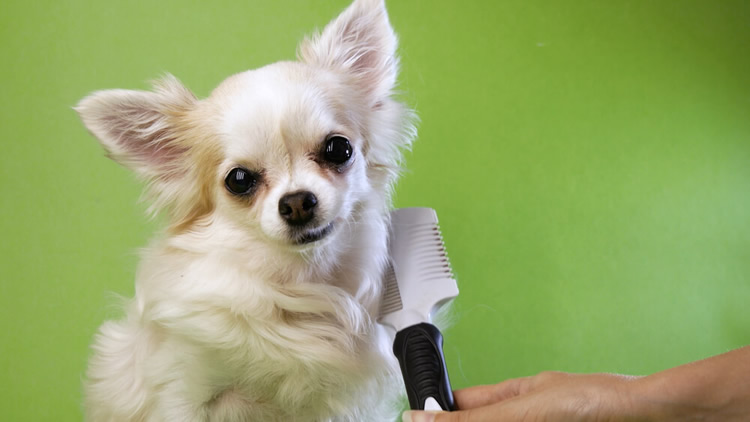
Chihuahuas require a moderate amount of grooming. You’ll need to brush your Chihuahua’s coat at least once a day to remove tangles and knots. If he has a long coat, you may need to brush his coat twice a day. Long-coat Chihuahuas have longer hair than smooth-coat Chihuahuas, so they are more susceptible to tangles and knots.
You’ll need to brush your Chihuahua’s teeth a couple of times per week to promote good oral hygiene. It will remove plaque that, if left unchecked, can turn into tartar. Plaque and tartar buildup may then place your Chihuahua at risk for periodontal disease, tooth decay and tooth loss.
Nail trimming is an important grooming process. Your Chihuahua may snag his nails on rugs, furniture or the carpet if they are too long. Long nails can also become ingrown Trimming your Chihuahua’s nails once every three to four weeks will prevent problems such as these.
You’ll need to bathe your Chihuahua as well. Even if he looks clean, your Chihuahua is probably harboring debris in his coat. Bathing him at least once every few weeks will remove dirt, dander and other forms of debris that could otherwise irritate his skin.
Health: Medium Maintenance
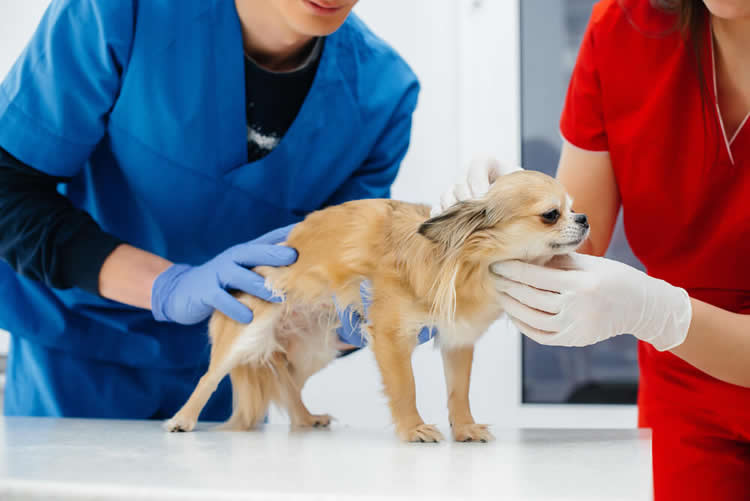
While they have one of the longest lifespans of all breeds, Chihuahuas aren’t immune to health problems. They are susceptible to a variety of diseases and conditions. Many Chihuahuas experience reverse sneezing episodes. This all-too-common respiratory condition involves spasms of the soft palate in a Chihuahua’s mouth, which causes him to rapidly inhale air while creating a wheeze or “goose-honking” sound.
Chihuahuas are susceptible to patellar luxation. It’s an orthopedic condition that involves the kneecap (the patella) slipping out of the groove in the femur. Patellar luxation may affect one or both of the Chihuahua’s hind legs. Chihuahuas suffering from patellar luxation will often hold up or “favor” the affected leg or legs.
Other common health problems in Chihuahuas include tracheal collapse, heart disease, hypoglycemia, seizures and hydrocephalus. Even with a predisposition to these diseases and conditions, though, Chihuahuas are still generally healthy.
Diet: Medium Requirements
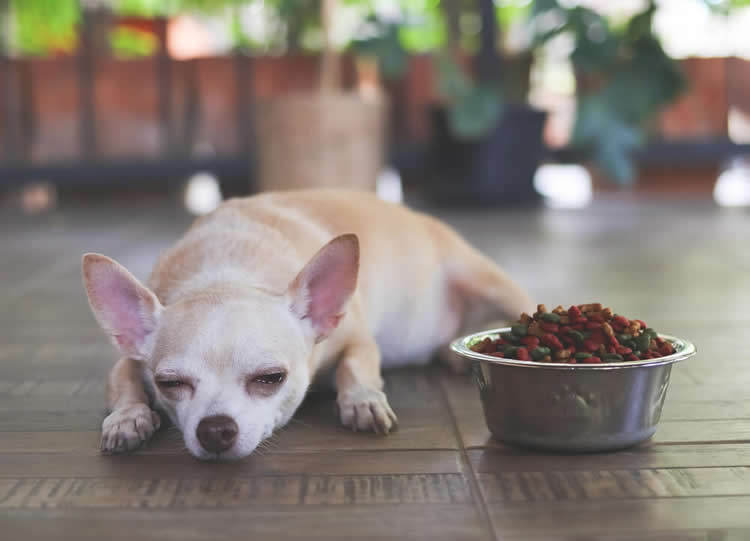
Chihuahuas have special dietary needs. You don’t need to necessarily feed your Chihuahua homemade meals, but you should feed him a kibble that’s formulated specifically for small dogs. Small dog kibble is smaller in size than standard kibble. Some Chihuahuas may struggle to bite and chew standard kibble, but the compact size of small dog kibble offers a solution.
Both standard kibble and small dog kibble contain three primary ingredients: protein, fat and carbohydrates. Small dog kibble, however, contains a higher concentration of protein and fat to carbohydrates. This calorie-dense formula allows for longer-lasting, more sustainable energy in Chihuahuas and other small dogs.
Potty Training: Medium
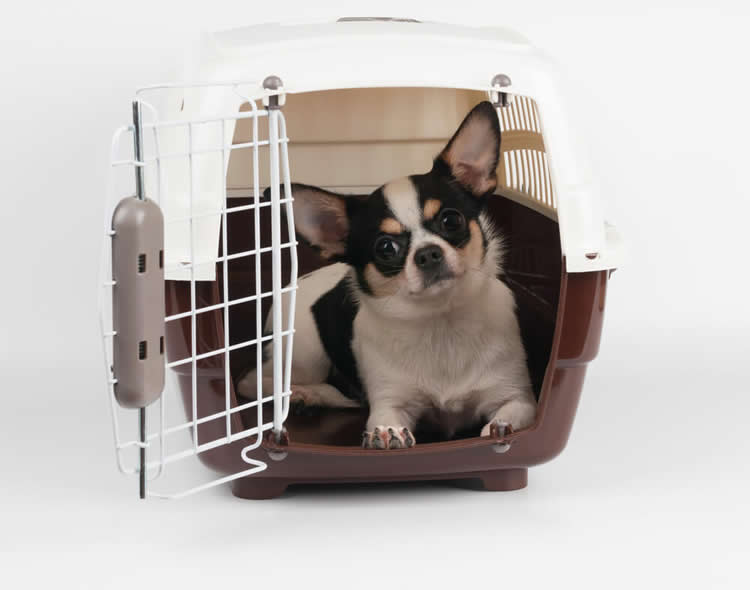
Chihuahuas have earned a reputation for being difficult to potty train, but this reputation may not be entirely deserved. Chihuahuas are sneaky. Because of their small size, they can sneak off to another area of the home to use the bathroom undetected.
After urinating in a particular spot, they may return to it. The urine of Chihuahuas and other dogs contains territory-marking enzymes. Chihuahuas can smell areas where they’ve urinated. A Chihuahua may sneak off initially to use the bathroom in an unoccupied room, and because of the enzymes he leaves behind, the Chihuahua will continue urinating in that same room.
Potty training is a hands-on activity. You can’t expect your Chihuahua to learn to use the bathroom outdoors unless you teach him. If you allow him to sneak off when nature calls, he will continue to use the bathrooms in your home. The lingering enzymes will attract him to that area of your home.
Here are some tips for a smoother and more effective potty-training regimen:
- Begin potty-training your Chihuahua at an early age, preferably between the ages of 12 and 16 weeks.
- Focus on reward-based potty-training in which you reward your Chihuahua with a treat and praise for using the bathroom. Punishment-based training is ineffective at best and counterproductive at worst.
- Confine your Chihuahua to a crate when you leave home. Most Chihuahuas enjoy being in their crate, as it offers them a sense of security. And as long as the crate isn’t too big, they typically won’t go the bathroom in it.
- When returning home, immediately take your Chihuahua out to use the bathroom.
- Use a verbal command like “go potty” or “go pee pee.” Over time, your Chihuahua will associate this command with the action of going to the bathroom.
- Choose a specific spot in your yard for your Chihuahua to use the bathroom.
- Establish a routine that involves taking your Chihuahua out to use the bathroom at regular intervals throughout the day.
Cold and Heat Sensitivity: High
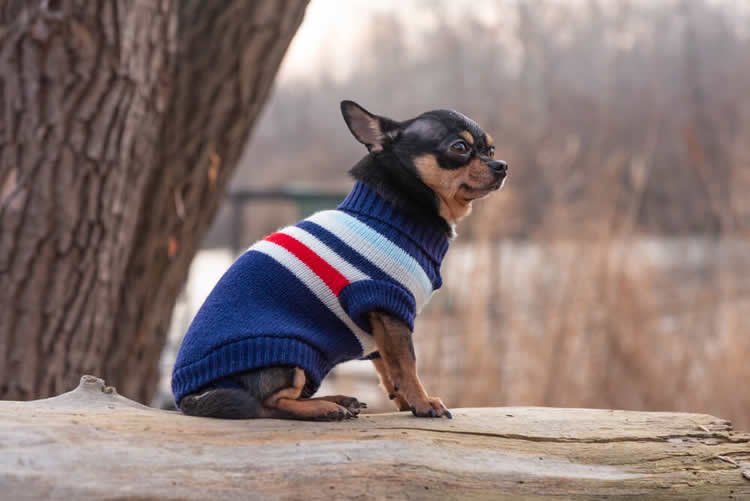
Chihuahuas are sensitive to cold and heat. Their small bodies allow them to quickly lose and gain heat in response to temperature changes in their surrounding environment. In cold weather, they’ll quickly lose body heat. In hot weather, they’ll quickly gain body heat. As an owner, you must take precautions to protect your Chihuahua from cold and hot weather.
You can protect your Chihuahua from cold weather by dressing him in clothes. Clothes offer a form of thermal insulation. A thick shirt or sweater will insulate your Chihuahua from the cold weather. Make sure your Chihuahua has warm bedding as well. Chihuahuas will often burrow under blankets and linens to stay warm.
You can protect your Chihuahua from hot summer weather by limiting his time spent outdoors during the midday sun. The sun is the hottest at around 3:00 p.m. Therefore, planning outdoor activities earlier or later in the day will help to protect your Chihuahua from heat exhaustion. You should also provide your Chihuahua with easily accessible water. Hydration is essential to protecting against heat exhaustion during the summer.
Mental Stimulation: Medium Maintenance

Chihuahuas require a moderate amount of mental stimulation. It promotes healthy cognitive function while warding off dementia and anxiety in the process.
Mental stimulation may even keep your Chihuahua happy. When bored, Chihuahuas can become depressed, or they may develop behavior problems. Mental stimulation forces Chihuahuas to use their brain, so they won’t become bored. Chihuahuas don’t need as much mental stimulation as purpose-bred dogs, but they still require a moderate amount.
Here are some mental stimulation activities to consider for your Chihuahua:
- Give your Chihuahua a hidden treat puzzle toy to play with. These toys are designed to encourage Chihuahuas and other dogs to solve a puzzle so that they can access a treat.
- In addition to hidden treat puzzle toys, you can hide treats around your home. Your Chihuahua will then have to his scent of smell to find the treats.
- Teach your Chihuahua a new trick, such as how to shake paws or how to sit.
- Take your Chihuahua for walks in unfamiliar areas, such as a park or hiking trail.
- Assign a name for your Chihuahua’s favorite toy. Try to teach your Chihuahua this name while he’s playing with it.
- Set up an agility course for your Chihuahua. Agility courses are obstacles that require a combination of physical and mental aptitude to complete.
In Conclusion
Chihuahuas aren’t high maintenance. Based on their energy, health, grooming, diet, potty-training, sensitivity to cold and heat and mental stimulation requirements, they are better classified as medium maintenance.
Do you think Chihuahuas are high maintenance? Let us know in the comments section below!